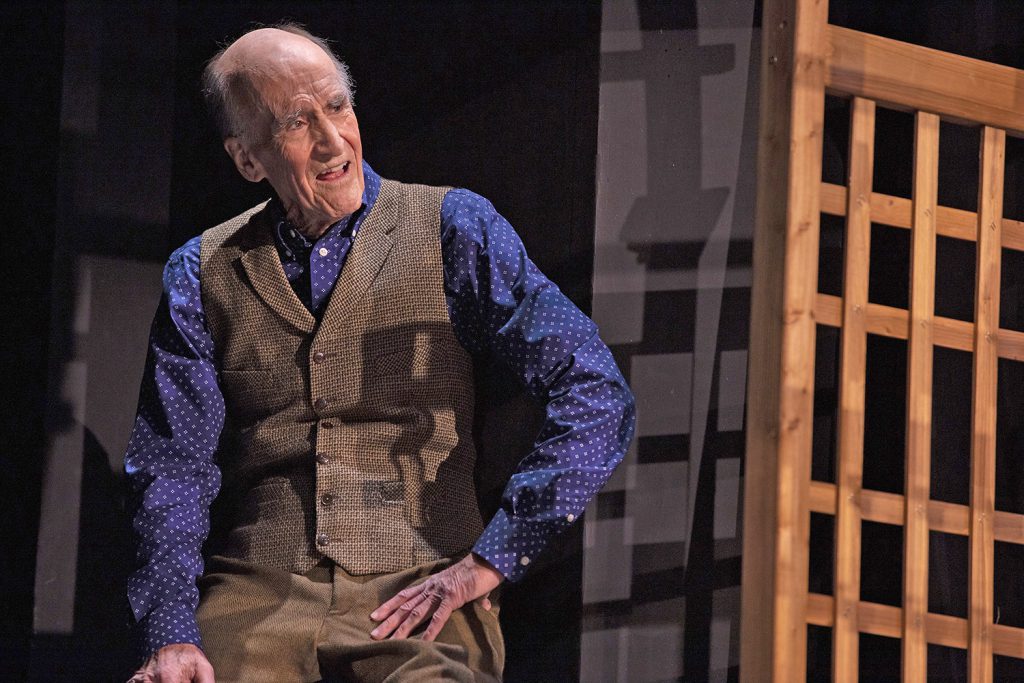
By Eric Marchese | Special to the NB Indy
“Our Town” is the quintessential South Coast Repertory show, and if you don’t believe that, catch the new Segerstrom Stage production.
Thornton Wilder’s Pulitzer Prize-winning 1938 play about a fictional small town in New Hampshire circa 1901 through 1913 is his stage masterpiece, produced at SCR roughly once per generation – in 1971, then 1998, and now this year.
And, no one could better portray the Stage Manager than Hal Landon Jr., a genial presence who shows us Grover’s Corners in the same way the actor’s Scrooge snarled at London for decades in SCR’s annual “A Christmas Carol.”
The play’s first act introduces us to daily life in the town of some 2,600, with the focus on two families: the Gibbs and the Webbs.
From the middle of the first act on, the budding relationship of Emily Webb (Grace Morrison) and George Gibbs (Evan Lugo) becomes the story’s focus: their friendship, falling in love, marrying and starting a family.
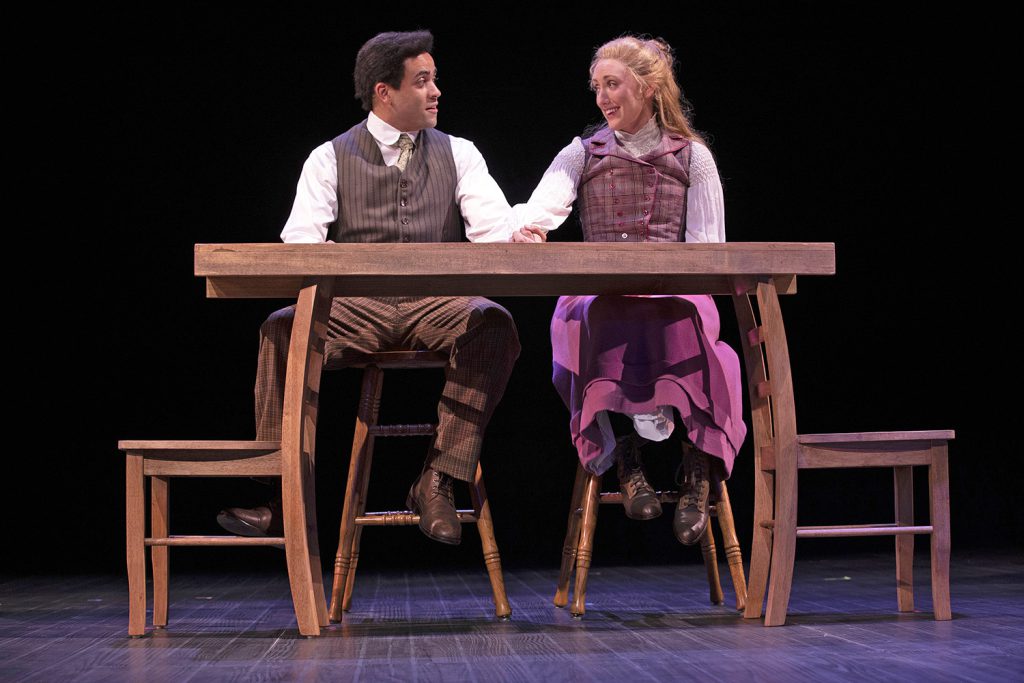
Act Two offers the Stage Manager’s wry observations about marriage and the various stances of Emily’s and George’s parents toward the wedding that will unite the two families.
If that sounds like all sweetness and light, hold on, because Act Three delivers a punch to the gut, using Emily’s death at age 28 to reveal and examine philosophical concerns of considerable impact and profundity.
In nearly every scene and line of dialogue, Wilder’s wisdom about and insights into the human condition shine. His humanity is evident in the seriocomic scene where Mr. Webb reassures his daughter and future son-in-law they’re making the right move, calming their pre-wedding jitters.
The superb, time-tested script also reveals the playwright’s concerns with social justice, industrial inequality and the like as well as his astonishing knowledge of art, literature, music, history, geography, sociology, anthropology, politics, geology and more. This is a rich work whose kind has rarely been seen since.
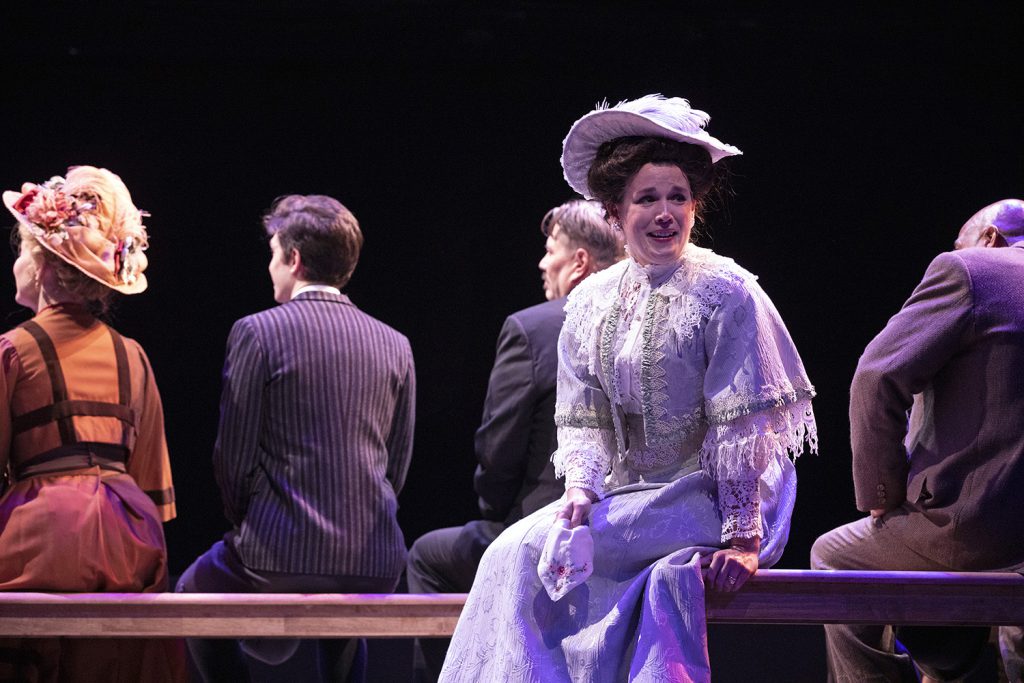
Director Beth Lopes delivers a Grover’s Corners that’s endearing without syrupy over-sentiment, yet also not too prosaic or gritty, its fanciful bits of idealized whimsy expertly meshed with some hard truths about life.
Efren Delgadillo, Jr.’s, scenic design follows Wilder’s adherence to minimalism, providing pleasing touches like the use of stage stepladders for George and Emily’s late-night chats from their second-story bedroom windows (think Romeo and Juliet minus the teen angst).
Kathryn Wilson’s costume design is pleasingly no-frills: Men, women and children have a classic, all-American look that might pass for any recent century, and Landon’s Stage Manager is simply yet effectively garbed in dress slacks, shoes and shirt, topped by a vest.
Lopes’ actors are well-cast, having perfected the art of pantomime, a necessity of Wilder’s script (that is, using as few set pieces and props as is do-able).
We realize before long that Morrison’s stately, outspoken Emily is riddled with self-doubts – and also that her awe over the beauty of moonlight and the heady perfume of flowers is part of her sensual nature.
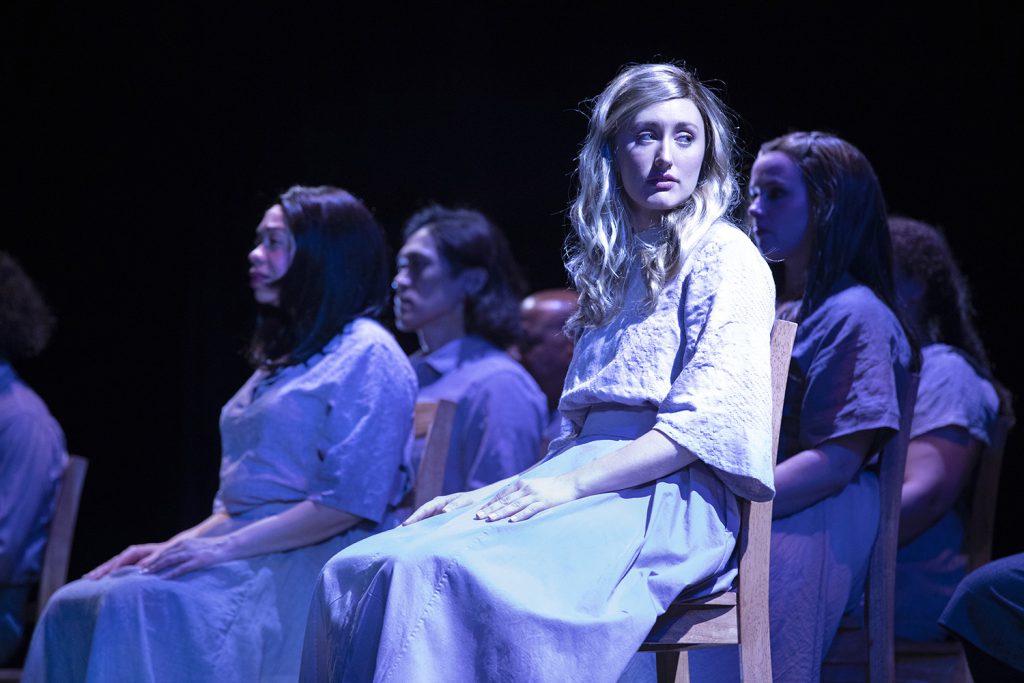
Lugo’s George is less sociable than girl-next-door Emily, having to push himself to talk to her. Lugo uses more shorthand than Morrison, effectively balancing George’s confident jock persona with that of a sensitive young man considerate of those around him.
Wilder tells his tale chronologically, with one exception: George and Emily skip from friendship to wedding before the Stage Manager presents a flashback: the famed soda fountain scene showing the pair at crossroads in their lives and involving George’s decision to remain in town so he and Emily can become a couple.
Corey Jones’ “Doc” Gibbs doesn’t suffer fools gladly, taking a stern tone toward son George’s frivolous ways, yet compassionately realizes that “some people just aren’t made for small towns.”
Elyse Mirto’s Mrs. Webb is a marvel of efficiency and order. Michael Manuel’s Mr. Webb, the town’s newspaper editor, merges pragmatism with kindness. Kwana Martinez’s Mrs. Gibbs is loving and effervescent in life, chillingly dispassionate as the spirit of her dead self.
Brad Culver blends comedic severity with consternation at his charges’ vocal ineptitude as Mr. Stimson, the town’s alcoholic church choirmaster (whose illness foreshadows his and Emily’s premature deaths).
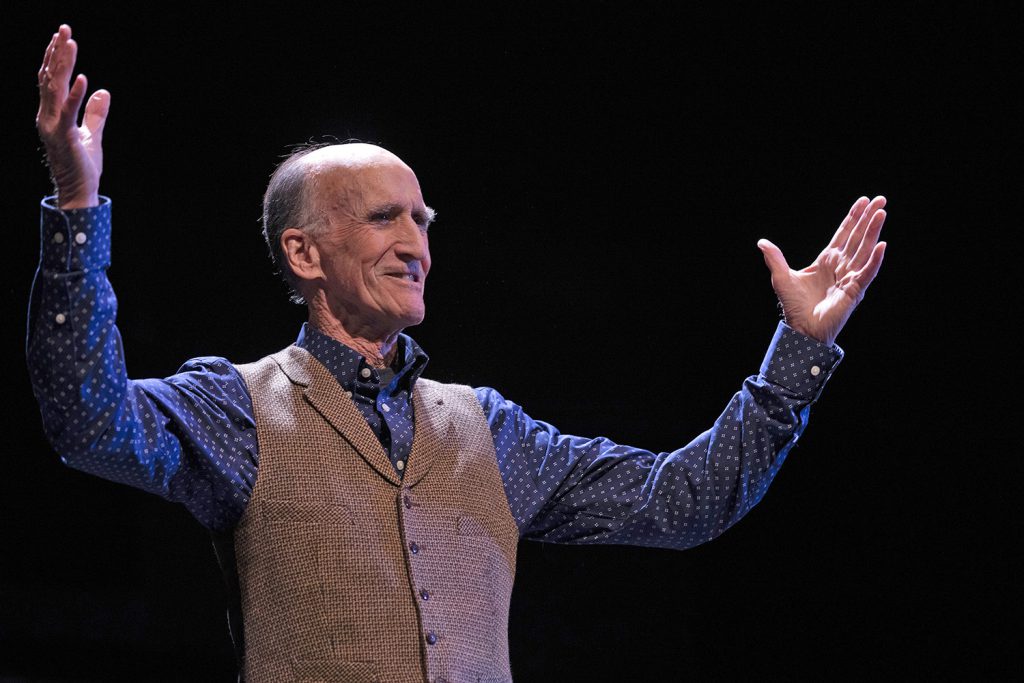
Landon is the ideal Stage Manager, drifting in and out of the frame, not only directing stage business but also taking on the roles of various townspeople. Throughout, the beloved actor, an SCR founding member, projects a persona extolling life’s joys, but also noting its ironies.
Only Wilder could get away with creating a character like the Stage Manager, and in having him assert that “when looking at the human race, you’ll find layers and layers of nonsense” – then, moments later, having him insist that “there’s something eternal, way deep down, in every human being.”
The final scene is at once eerie, ethereal, surreal and heart-wrenching. Seems most of us are so busy living life that we fail to realize the beauty of all humanity, the earth and the heavens – at least not until we’ve become washed-out, expressionless spirits looking down at our former realm with a mixture of scorn and pity.
By depicting the Grover’s Corners Emily re-visits on her 12th birthday in blazing technicolor, Lopes and company take a leaf from the early 2000s Broadway staging, a startling shift perfectly realized by Delgadillo’s vibrant scene work and Karyn D. Lawrence’s lighting design.
Emily’s brief return to her childhood life yet again evinces Wilder’s genius: She’s both her mortal, 12-year-old self and, at the same time, a now-deceased spirit whose knowledge of the future can only serve as a source of pain. The play’s compelling closing minutes deliver some of the most heart-rending words ever heard on stage.
Almost as soon as it premiered, “Our Town” quickly became the international, universal play Wilder always knew it was and hoped it would be. “Our Town,” the play tells us, isn’t just Grover’s Corners – it’s a mirror of whatever town that’s staging it.
So visit “our town” of Costa Mesa while you can, and behold a masterpiece.
Segerstrom Stage, South Coast Repertory, 655 Town Center Drive, Costa Mesa. Through June 4. Running time: Two hours, 20 minutes (includes two intermissions). Tickets: $26 to $93. Purchase/information: 714-708-5500, www.scr.org.
